Notes
| General topics | |||||||||||||||||
|---|---|---|---|---|---|---|---|---|---|---|---|---|---|---|---|---|---|
| Genres |
| ||||||||||||||||
| Musicians | |||||||||||||||||
| Musicians by genre | |||||||||||||||||
| Standards | |||||||||||||||||
| Discographies | |||||||||||||||||
| Festivals | |||||||||||||||||
| Culture | |||||||||||||||||
| Regional scenes |
| ||||||||||||||||
| History | |||||||||||||||||
| Related | |||||||||||||||||
| Media | |||||||||||||||||
Neo-bop as a subgenre emerged within jazz during the early 1980s.
This list is derived from All Music [1] and may contain inaccuracies. In addition the source indicates most or all these musicians work in others genres as well with Post-bop and Hard bop being most common.

Wynton Learson Marsalis is an American trumpeter, composer, and music instructor, who is currently the artistic director of Jazz at Lincoln Center. He has been active in promoting classical and jazz music, often to young audiences. Marsalis has won nine Grammy Awards, and his oratorio Blood on the Fields was the first jazz composition to win the Pulitzer Prize for Music. Marsalis is the only musician to have won a Grammy Award in both jazz and classical categories in the same year.

Hard bop is a subgenre of jazz that is an extension of bebop music. Journalists and record companies began using the term in the mid-1950s to describe a new current within jazz that incorporated influences from rhythm and blues, gospel music, and blues, especially in saxophone and piano playing.
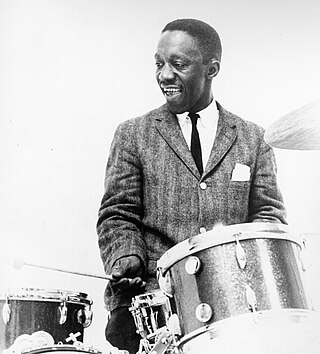
Arthur Blakey was an American jazz drummer and bandleader. He was also known as Abdullah Ibn Buhaina after he converted to Islam for a short time in the late 1940s.
Junko Onishi is a Japanese jazz pianist; she plays in the post-bop genre.

Kenneth David Kirkland was an American pianist and keyboardist.
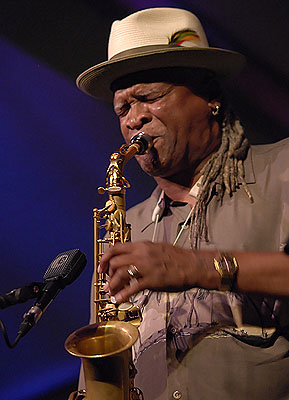
Robert Michael Watson Jr., known professionally as Bobby Watson, is an American saxophonist, composer, and educator.
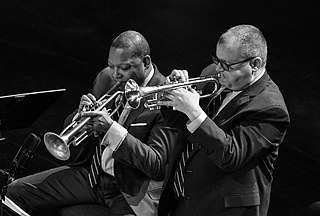
Straight-ahead jazz is a genre of jazz that developed in the 1960s, with roots in the prior two decades. It omits the rock music and free jazz influences that began to appear in jazz during this period, instead preferring acoustic instruments, conventional piano comping, walking bass patterns, and swing- and bop-based drum rhythms.

Black Codes (From the Underground) is a 1985 album by jazz trumpeter Wynton Marsalis.
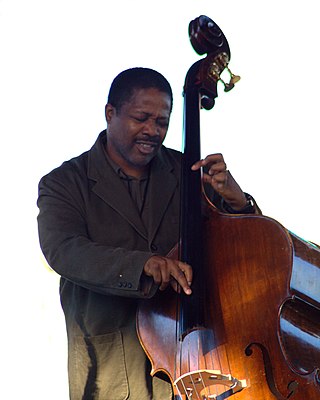
Rodney Whitaker is an American jazz double bass player and educator.
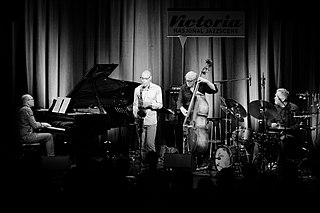
Neo-bop refers to a style of jazz that gained popularity in the 1980s among musicians who found greater aesthetic affinity for acoustically based, swinging, melodic forms of jazz than for free jazz and jazz fusion that had gained prominence in the 1960s and 1970s. Neo-bop is distinct from previous bop music due to the influence of trumpeter Wynton Marsalis, who popularized the genre as an artistic and academic endeavor opposed to the countercultural developments of the beat generation.

Ray Drummond is an American jazz bassist and teacher. He also has an MBA from Stanford University, hence his linkage to the Stanford Jazz Workshop. He can be heard on hundreds of albums and co-leads The Drummonds with Renee Rosnes and Billy Drummond.

Standard Time, Vol. 2: Intimacy Calling is an album by jazz trumpeter Wynton Marsalis that was released in 1990. The album reached peak positions of number 112 on the Billboard 200 and number 1 on the Billboard Top Jazz Albums chart.

Random Abstract is a jazz album by saxophonist Branford Marsalis recorded August 12–13, 1987 at Sound City Studios in Tokyo, Japan. It peaked at number 6 on the Top Jazz Albums chart. It was nominated for two Grammy Awards in 1988, Best Jazz Instrumental Performance, Soloist and Best Jazz Instrumental Performance, Group.

The Jazz Messengers were a jazz combo that existed for over thirty-five years beginning in the early 1950s as a collective, and ending when long-time leader and founding drummer Art Blakey died in 1990. Blakey led or co-led the group from the outset. "Art Blakey" and "Jazz Messengers" became synonymous over the years, though Blakey did lead non-Messenger recording sessions and played as a sideman for other groups throughout his career.
"Yes sir, I'm gonna to stay with the youngsters. When these get too old, I'm gonna get some younger ones. Keeps the mind active."

Crazy People Music is a jazz album featuring the Branford Marsalis Quartet, led by saxophonist Branford Marsalis and featuring Kenny Kirkland, Jeff "Tain" Watts, and Robert Hurst. It was recorded January 10, February 18, and March 1, 1990 at RCA Studios in New York, New York. It peaked at number 3 on the Top Jazz Albums chart. It was nominated for a Grammy Award in 1990 for Best Jazz Instrumental Performance, Soloist.

I Heard You Twice the First Time is a jazz album by Branford Marsalis that explores different aspects of the blues, featuring guest appearances from B.B. King, John Lee Hooker, Russell Malone, Wynton Marsalis and Linda Hopkins. It peaked at number 1 on the Top Jazz Albums chart. The album won the Grammy Award for Best Jazz Instrumental Performance, Individual or Group.
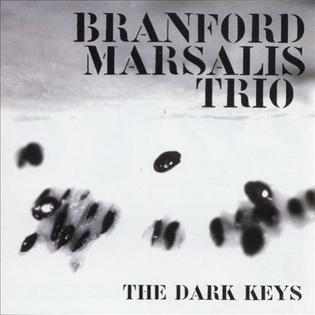
The Dark Keys is a jazz trio album by the Branford Marsalis Trio, featuring Branford Marsalis, Reginald Veal, and Jeff "Tain" Watts, with guest appearances from Kenny Garrett and Joe Lovano. Recorded July 31 to August 2, 1996, in the Tarrytown Music Hall in Tarrytown, New York, the album reached Number 9 on the Billboard Top Jazz Albums chart.
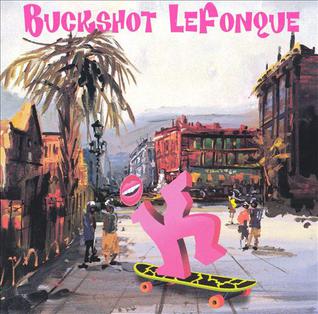
Music Evolution is the second album of Branford Marsalis's jazz/hip-hop/rock group Buckshot LeFonque. Featuring guest appearances from David Sanborn, Guru and Laurence Fishburne, the album peaked at number 8 on the Billboard Top Contemporary Jazz Albums chart. The album is notable in Branford's discography for marking his first collaboration with pianist Joey Calderazzo and bassist Eric Revis, both of whom would go on to record in his quartet in the 2000s and 2010s.

Requiem is a jazz album by the Branford Marsalis Quartet, featuring Branford Marsalis, Eric Revis, Jeff "Tain" Watts, and Kenny Kirkland. The recording, Kirkland's last before his death in November 1998, was dedicated to his memory. Recorded August 17–20 and December 9–10, 1998 in the Tarrytown Music Hall in Tarrytown, New York, the album reached Number 8 on the Billboard Top Jazz Albums chart.